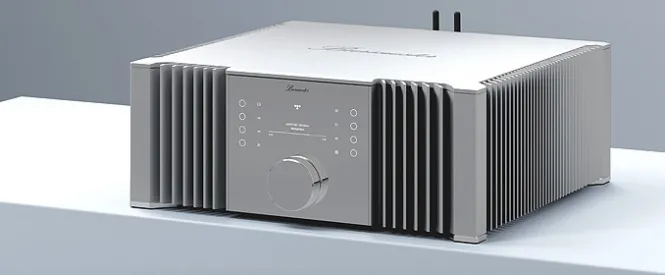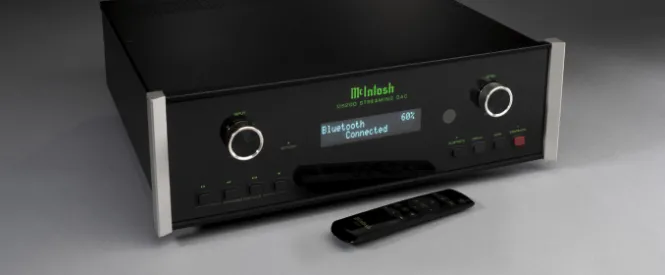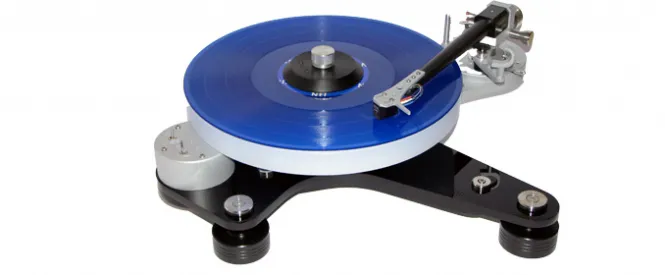Musical Fidelity M6x ViNYL Phono Stage Review
David Price takes this versatile new audiophile phono stage for a spin…
Musical Fidelity
M6x ViNYL Phono Preamplifier
£1,699
One of hi-fi’s many contentious topics is the relative difference in sound quality between discrete circuitry vs. op-amps. Many think that you get better results from so-called operational amplifier chips – effectively integrated circuits designed to amplify signals – than you would by designing a circuit the old fashioned way, with separate transistors on a printed circuit board. Others strongly disagree – so it’s interesting to see Musical Fidelity fall into the latter category.
I’ve tried hundreds of phono stages over the years, and my favourites tend to be discrete transistor designs or tube products – the latter, of course, have to be discrete anyway. I have reviewed some highly regarded op-amp based designs over the years and found most to have quite ‘samey’ sound, best described as a bit technical or even clinical. As ever, it’s as much down to how you do things as it is what you do – but for me, this has been a recurring theme. Whereas the previous M6 ViNYL was op-amp based, the new M6x ViNYL is not.
However, there’s more to life than transistors, you know. Its gain stage may be old school, but its front end certainly isn’t. Its full size (440x100x380mm, 5.5kg) case features three separate, independently selectable cartridge inputs under microprocessor control. You can toggle between three different turntables, with a choice of MM (47k ohm, 50-400pF) or MC (25-1.2k ohm, 470pF) and +6dB gain on/off. Two pairs of RCA unbalanced inputs and one pair of balanced XLR ins are fitted around the back, so you can keep three turntables permanently attached and switch between them, instead of having to plug and unplug them. Balanced XLR and unbalanced RCA phono outputs are also provided. It’s a lovely interface, and gives analogue addicts a lot of control over what they’re listening to – I can see people buying it for this fact alone.
THE LISTENING
I’ve heard a lot of phono stages recently, and this takes its rightful place up there with the best at its price point. It has a spry, light and detailed sound with lots of detail and a lovely spacious soundstage. Music comes at you on a large scale through the M6x ViNYL, reminding us what the venerable LP record is capable of if properly handled. Yet it’s not one of those syrupy, sumptuous sorts of phono stages, that seem to work more as an effects unit than a supposedly neutral amplifier. Far from it…
The Musical Fidelity’s open and expansive soundstage is rather special. Everything is in its correct place, with each instrument in the mix able to play happily along without being swamped by any other. Glen Campbell’s Witchita Lineman showed how lovely this experience can be. The tracks’ trademark soaring strings and backing brass were set neatly behind the lead vocal, guitar and percussion. I was impressed by the air around the instruments, and the general vastness of the recorded acoustic, which made my CD version sound positively closed-in.
Then there’s its detail and transparency. The way the M6x ViNYL – with the help of my Michell GyroDec/TecnoArm turntable and Lyra Dorian moving coil – unpacked this track was quite something. Instrumental timbre was natural and believable; strings were wonderfully wiry but not edgy from my first pressing of this classic LP, which has never been anywhere near a digital cutting lathe, let alone a digital remaster or recorder. Campbell’s voice was also wonderfully tactile like he was in the room with me. I got the same fabulous results with Kate Bush’s Moving, which was positively ethereal.
Compared to ModWright’s PH 9.0 tube phono stage – admittedly nearly twice the price – the Musical Fidelity has a slightly well lit upper midband and a drier and leaner bass. Yet this is subtle, and on some records even helps to illuminate an otherwise murky mix – such as with Rose Royce’s Wishing on a Star. Yet the M6x ViNYL is never unpleasant to listen to; indeed, its excellent detail retrieval and fine timbre make it a pleasure. And then there’s the unit’s lovely rhythmic swing. This phono stage lets the music sashay along with a spring in its step. It always sounds positive, propulsive and purposeful – without ever being in your face. The result is a delightfully lilting musicality, one that few of its price rivals can match.
THE VERDICT
 Overall, this is an excellent phono stage for the money and treads a path between high-end sound, versatility and user convenience. It’s not quite top tier material, but is nowhere near the price of no-compromise design and still has two major pluses – its discrete transistor design and its connectivity. The super build, finish and fine styling all go without saying – so hear it if you can.
Overall, this is an excellent phono stage for the money and treads a path between high-end sound, versatility and user convenience. It’s not quite top tier material, but is nowhere near the price of no-compromise design and still has two major pluses – its discrete transistor design and its connectivity. The super build, finish and fine styling all go without saying – so hear it if you can.
For more information visit Musical Fidelity
David Price
David started his career in 1993 writing for Hi-Fi World and went on to edit the magazine for nearly a decade. He was then made Editor of Hi-Fi Choice and continued to freelance for it and Hi-Fi News until becoming StereoNET’s Editor-in-Chief.
Posted in: Amplifiers | Phono Preamplifiers | Applause Awards | 2021 | Hi-Fi
JOIN IN THE DISCUSSION
Want to share your opinion or get advice from other enthusiasts? Then head into the Message
Forums where thousands of other enthusiasts are communicating on a daily basis.
CLICK HERE FOR FREE MEMBERSHIP
Trending
applause awards
Each time StereoNET reviews a product, it is considered for an Applause Award. Winning one marks it out as a design of great quality and distinction – a special product in its class, on the grounds of either performance, value for money, or usually both.
Applause Awards are personally issued by StereoNET’s global Editor-in-Chief, David Price – who has over three decades of experience reviewing hi-fi products at the highest level – after consulting with our senior editorial team. They are not automatically given with all reviews, nor can manufacturers purchase them.
The StereoNET editorial team includes some of the world’s most experienced and respected hi-fi journalists with a vast wealth of knowledge. Some have edited popular English language hi-fi magazines, and others have been senior contributors to famous audio journals stretching back to the late 1970s. And we also employ professional IT and home theatre specialists who work at the cutting edge of today’s technology.
We believe that no other online hi-fi and home cinema resource offers such expert knowledge, so when StereoNET gives an Applause Award, it is a trustworthy hallmark of quality. Receiving such an award is the prerequisite to becoming eligible for our annual Product of the Year awards, awarded only to the finest designs in their respective categories. Buyers of hi-fi, home cinema, and headphones can be sure that a StereoNET Applause Award winner is worthy of your most serious attention.





